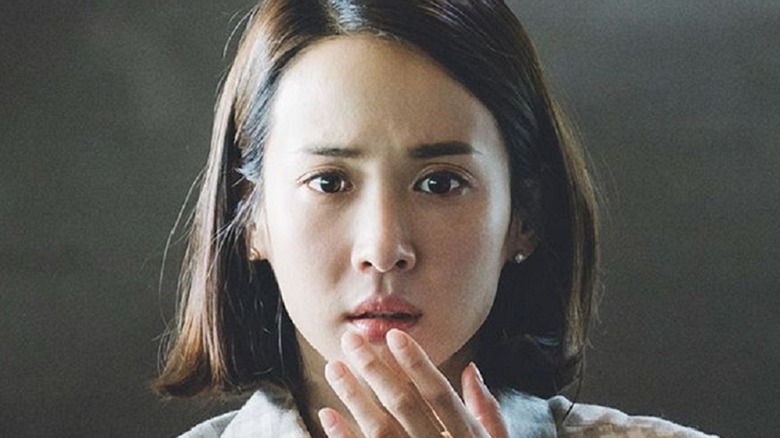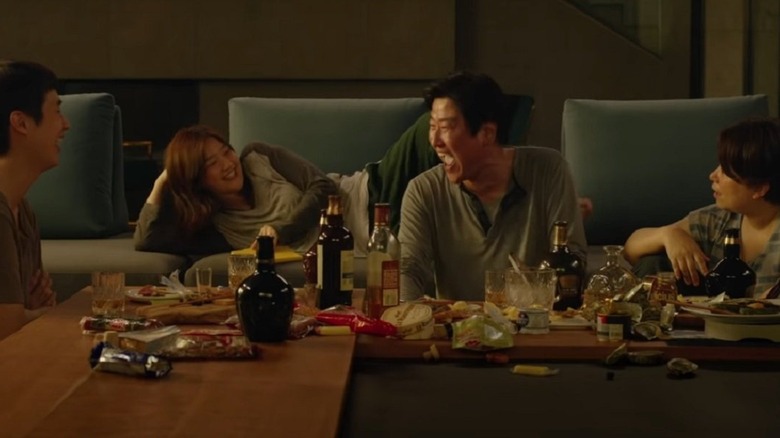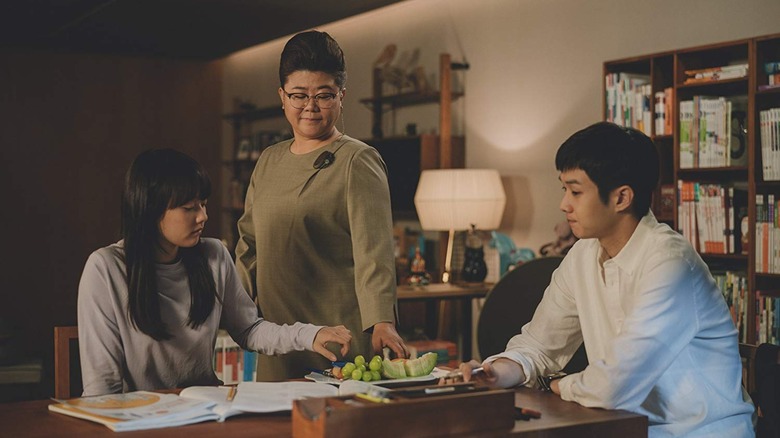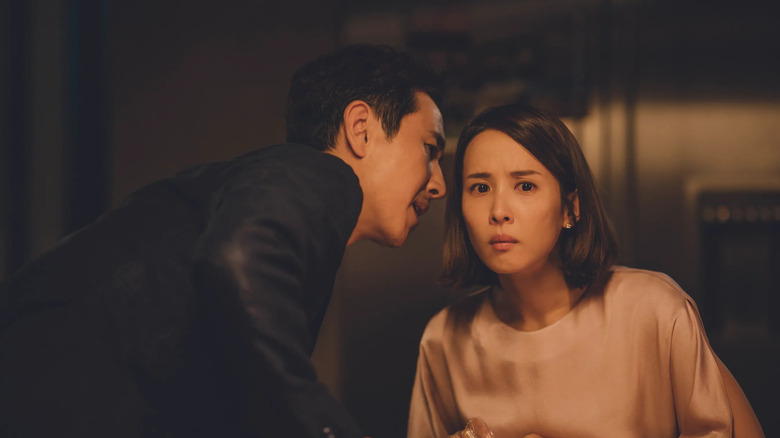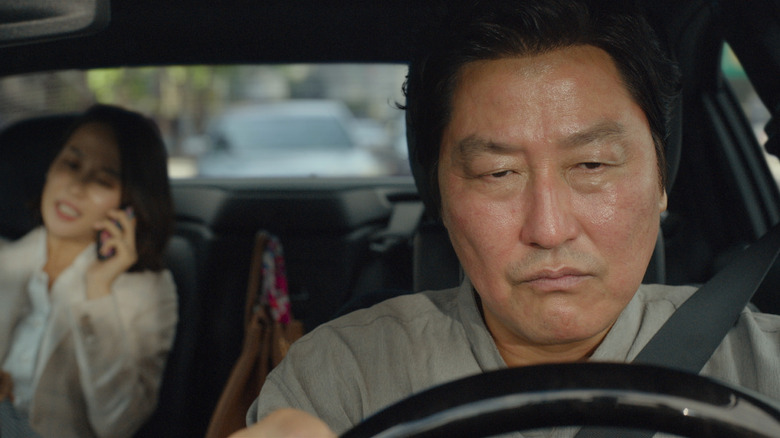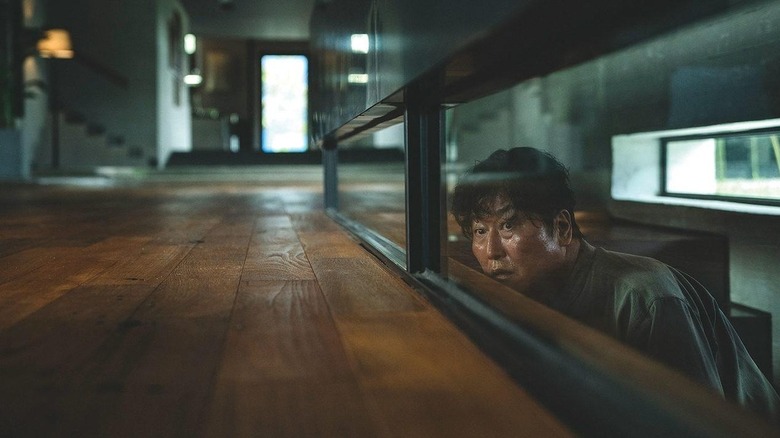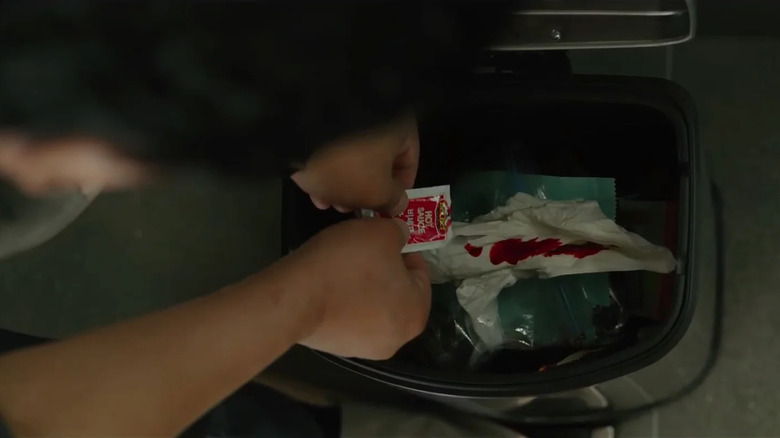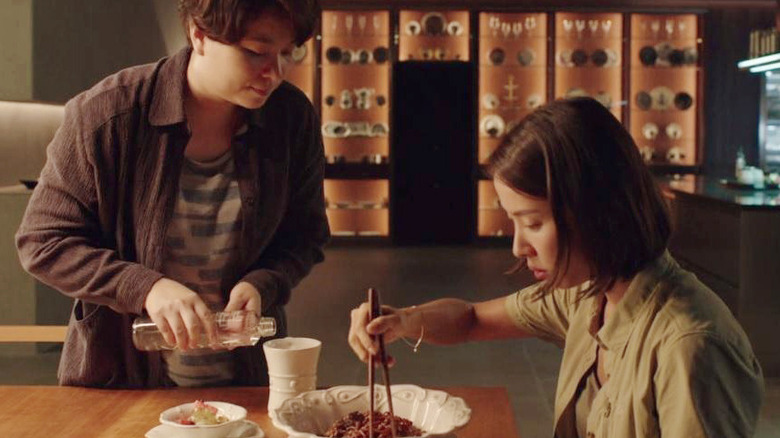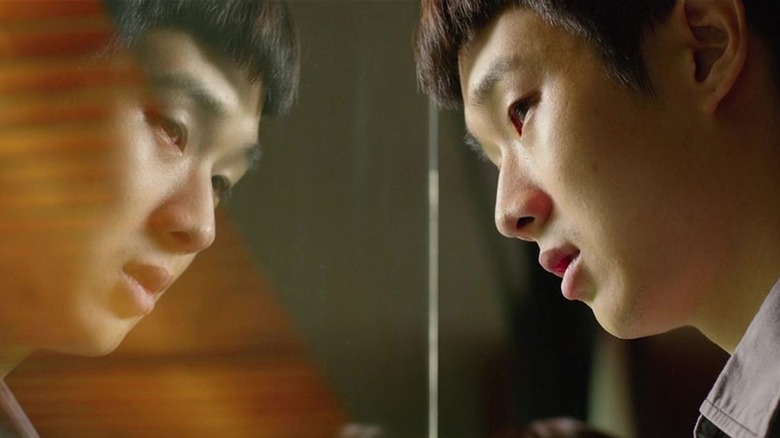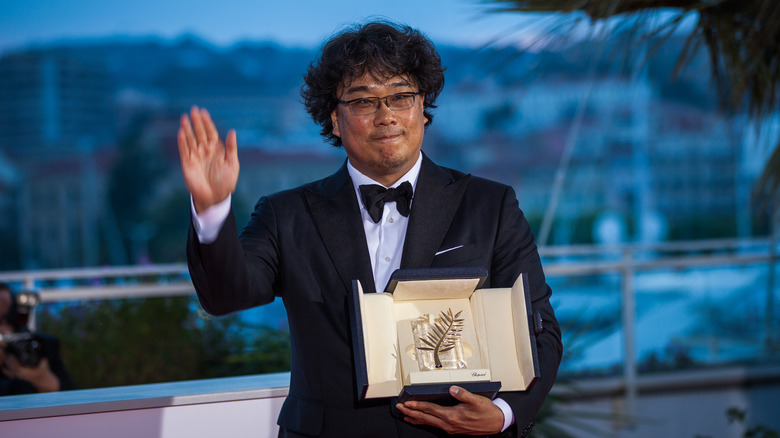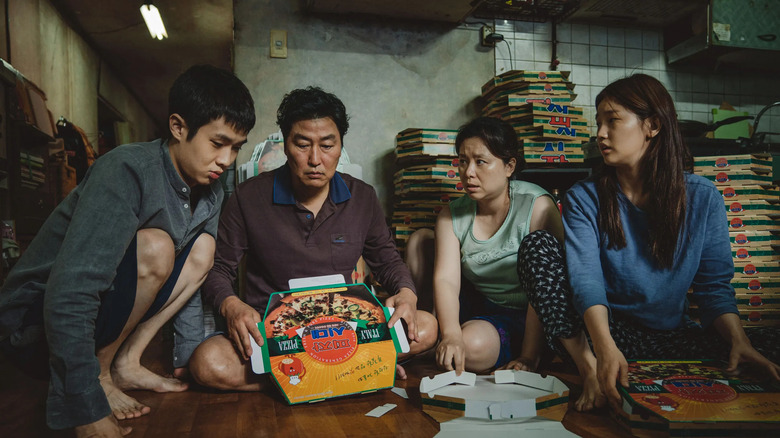Parasite Facts To Prepare Fans For The Upcoming HBO Series Spinoff
Back in 2019, movie theaters were dominated by tentpole franchises like never before. There were three DC comics films, three Marvel Cinematic Universe installments (including "Avengers: Endgame"), and four live-action Disney re-imaginings, not to mention sequels to "John Wick," "The Fast and the Furious," "The Lego Movie," "Frozen," "Toy Story," and "Star Wars." All that familiar IP made 2019 the most profitable year in cinema history, but despite those recognizable characters and their built-in fanbases, the most talked-about and celebrated movie was a wholly original and difficult-to-classify Korean film made for about $12 million.
"Parasite," written and directed by Bong Joon-Ho, didn't exactly take the world by storm. This modest but brilliant genre-bender premiered in May, played the festival circuit, and eventually wriggled its way into theaters and onto television screens across the world thanks to fawning reviews and strong word of mouth, eventually making a staggering $253 million.
Bong's film, about one family struggling to make ends meet and another with more wealth than they know what to do with, is part thriller, part family drama, and part social satire. Thanks to its ingenious script, sleek production design, and virtuoso compositions, "Parasite" fully functions as both high art and crowd-pleasing entertainment. But this masterpiece didn't just happen. It took years of work on the part of passionate and dedicated professionals to pull off one of the most impressive cinematic achievements — certainly of this century and arguably of all time.
Parasite started out as a play
Bong Joon-ho initially conceived of "Parasite" as a play after a friend who worked in live theater challenged him to create something for the stage (per The Hollywood Reporter). The director was finishing up work on his film "Snowpiercer" (another piece about wealth inequality) and was intrigued by the idea. The parameters of live theater pushed Bong to trim down his typically sprawling settings in movies like "The Host" and "Okja" to but a few static locations. He imagined a story that could be told in two houses: one belonging to a rich family and one rented by a poor family. Those families became the Parks and the Kims.
Plays typically have much smaller casts than movies, and fewer opportunities for the kinds of supernatural or action set pieces that Bong is known for. This presented yet another challenge — "Parasite" would have to live up to Bong's reputation for building ever increasing tension, and it would have to do it with a handful of characters merely talking in a handful of rooms. Ultimately, Bong decided that he'd rather explore the cinematic aspects of class clashing, though he largely kept the rest of his self-imposed limitations in place.
Fairly early on in the process, he turned the idea for the theatrical production of "Parasite" into a 15-page screenplay treatment. Three drafts later (he co-wrote with his production assistant, Han Jin-won), "Parasite" began shooting in 2018 and wrapped after just 77 days (via Korean Film). Though one can definitely imagine the small scale story of the Parks and the Kims unfolding live on a proscenium, the massive success of the film version is proof enough that Bong made the right choice.
Like Ki-woo, Bong Joon-Ho worked as a tutor
Bong knew that, in order to get obscenely privileged characters to interact with impoverished characters, he'd need a plausible inciting incident that would allow one of the Kims to intrude on the lives of the Parks. For that plot point, the celebrated Korean director needed only to look back on his own employment history. On the advice of this then-girlfriend (and now wife), Bong himself had tutored for a well-to-do family to supplement his income during college. He told The Atlantic's David Sims that he got the feeling he was "infiltrating the private lives of complete strangers," and that the idea of inviting friends over had occurred to him, so that they could see what life was like for the ultra rich.
That experience became the narrative framework for at least the first half of "Parasite." Ki-woo pretends to be an English student and is hired to tutor the Park's teenage daughter, Da-hye. Once he establishes himself as a trustworthy employee, he "recommends" a sought after art teacher (his sister, Ki-jung), housekeeper (his mother, Chung-sook), and chauffeur (his father, Ki-taek) without divulging the fact that the new help are all related to him. Anyone who's seen "Parasite" knows that things don't work out so well in the end for the Kims. As for Bong Joon-ho, he may have gone on to become an acclaimed filmmaker, but as he told Variety, he was fired from his tutoring gig after two months (apparently, he was bad at math).
The title has two meanings
The dictionary definition of parasite reads, "an organism living in, on, or with another organism in order to obtain nutrients, grow, or multiply often in a state that directly or indirectly harms the host." It's a metaphor similar to one Bong's used before with 2006's "The Host," in which a sea creature is said to be the carrier of a deadly, spreadable virus. This time, the metaphor is, well, a little more metaphorical as Ki-woo would say, but "Parasite" (or "Gisaengchung" in Korean) is even more pointed in its social commentary.
From one perspective, the Kim family is living parasitically off of the Park family. They're lying about their credentials and expertise, and even their identities. They resort to unsavory methods to get the Park's previous employees out of the way, and when the house is empty, they treat themselves to the Parks' luxuries. When the Kims discover Gook Moon-gwang and her husband living in the basement, one might consider that the two of them are the real parasites, subsisting in the bowels of the house without sunlight or socialization. However, one could also argue that the Parks are the titular parasites. They benefit from generational wealth, Mr. Park doesn't physically labor and keeps much more of the profits than do his employees, and Mrs. Park pays others low wages to do parental tasks and basic household chores. For the record, Bong has stated that the term applies both ways viewers look at it (via IGN).
Some actors had worked with Bong before
If you're a fan of Bong Joon-ho's films, then you might recognize a few of the faces in "Parasite" from his earlier work. Song Kang-ho, who plays the patriarch of the Kim family, is a longtime and frequent collaborator going back to 2003's "Memories of Murder," Bong's second feature film after his low budget and barely seen debut, 2000's "Barking Dogs Never Bite." In "Memories of Murder," which is loosely based on the true story of a South Korean serial killer, Song plays the detective trying to solve a string of crimes. Next came "The Host," in which Song is the protagonist, a slacker street vendor whose daughter is taken by the mysterious creature. Song also appears in 2013's "Snowpiercer," about a fast-moving train upon which all remaining humanity lives after climate change has brought about another ice age.
Bong has come to rely on Song as a creative partner so much that he claims he wouldn't have made "Parasite" if the actor hadn't agreed to star in it. That turned out not to be an issue. As the pair revealed in an interview with IMDb, Song said yes without knowing anything about the movie, but he was thrilled once he read the "sharp" and "funny" script.
Choi Woo-shik, who plays Ki-wo, signed on sight unseen, too. Choi had a small role in 2017's "Okja," about a girl's quest to save her prize pig from industrialized meat processors. Lee Jung-eun, who plays the Parks' first housekeeper, Moon-gwang, had also previously worked with Bong on his 2009 thriller, "Mother."
The sets used practical and digital effects
What "Parasite" lacks in the quantity of its sets it more than makes up for in quality and thematic resonance. The production design of the Parks' house in particular is one of the standout elements of the film. In-world, the structure was drawn up and built by fictional famous architect Namgoong, who was also its prior occupant. But really, the minimalist masterpiece that the Parks call home doesn't exist, at least not as we see it on screen. The two-story building is actually four separate sets rendered together with visual effects in post-production (per Great Big Story). Bong and designer Lee Ha-jun utilized sunlight (or lack thereof) and the home's many staircases to tell a symbolic story about the Parks, the Kims, and the Gooks. As characters physically ascend or descend, they're also metaphorically ascending or descending in terms of their power.
The Kims semi-basement apartment has literal and figurative importance, too. That they live half-underground with a street level view is meant to indicate that they're practically at the bottom of the economic ladder, but they still have hope that they can rise. However, their low position makes them susceptible to flooding in a way that the Parks, who live on a hilltop garden lot, are not. This happens when it rains in the latter half of "Parasite." A fifth set of the Kims' neighborhood was constructed inside a water tank so that the flooding scene could happen practically (per The Atlantic). Again, symbolically, filth flows downhill from the wealthy to the poor. It might look like Ki-woo and Ki-jung are sitting in sewage, but as documented by The Academy, face mask clay was used to mimic the look of contaminated water.
The props tell their own story
In a movie as intricate as "Parasite," with depictions of a household as poor as the Kims and a home as minimalist and immaculate as the Parks', every single item matters. One of the first props that appears in the film is the scholar's rock (or Suseok) that Ki-woo's friend, Min-hyuk, gives to the Kims. The stone is supposed to bring good luck, especially as it pertains to money, but Mrs. Kim mutters that he should've just brought food. Ki-woo and his father, however, buy into the metaphor. Later, the rock is shown to be floating in the flood water, which should clue Ki-woo into the fact that it's a false idol, but he saves it nevertheless. Ironically, Ki-woo nearly dies when Geun-sae bludgeons him in the head with it.
Production designer Ha-Jun Lee explained that it was quite easy procuring the items for the semi-basement apartment — they were cheap or free (via Great Big Story). The set decorations in the Park residence, on the other hand, were not. In the interest of authenticity, the furnishings and props in the Park house were specifically chosen because they were high end. This includes everything from the almost priceless art to the high-end garbage can. The quiet-closing trash receptacle cost a whopping $2,500.
Jessica sings an actual Korean song
In one of the most famous scenes from "Parasite," Ki-woo's sister, Ki-jung, poses as his cousin "Jessica" to get a job doing art therapy with Mrs. Park's ADHD-diagnosed son, Da-song. The Kim siblings sing a rhythmic little ditty to each other to reinforce the details of their con. "Jessica. Only child. Chicago, Illinois. My classmate Jin-mo is cousin of Kevin," are the words. The "Jessica Jingle" went viral, with fans of the film making and sharing GIFs of the ear wormy moment. In the context of the film, the sing-songy lie shows how casual Ki-woo and Ki-jung are being about ripping off Mrs. Park, but it also shows the comfort level between brother and sister. Ki-woo and Ki-jung are in sync with each other, which makes the ending of "Parasite" that much more tragic.
The music to which the Jessica Jingle is set belongs to a well-known South Korean children's song called "Dokdo Is Our Land." It's a nationalistic chant of sorts written around 1983 about a territorial dispute between South Korea and Japan. The song became a popular means of teaching South Korean elementary school children to remember complicated information by setting that information to the simple beat and melody (via ACMI). Though the bit worked for global audiences, the inclusion of "Dokdo Is Our Land" in "Parasite" is a special in-joke for South Korean audiences who would've heard and perhaps even memorized facts to the song in their youth.
Ram-don is a made up word for a real food
Another scene that made an impression on audiences is the Kim family's mad scramble to clean up, prepare food, and outwit the Gooks after the Parks call to inform them they're cutting their camping trip short and returning home. In particular, Mrs. Kim requests that Chung-sook whip them up some ram-don, as it's Da-song's favorite. She asserts that, if Chung-sook starts immediately, it should be ready by the time they arrive, and she adds that there's prime flank steak in the fridge, which she would like added to the noodles.
In the original Korean, the dish is called jjapaguri. Jjapaguri is a quick, easy, and cheap comfort food made of two different types of instant noodles cooked together (per Food52). That the Parks want high-grade steak mixed into their midnight snack is yet another symbol of the extent to which excess and luxury are their norms. When it came time to write the English subtitles for "Parasite," a translator suggested the name "Ram-Don," which is a made-up compound word that draws from "ramen" and "udon," what English-speaking audiences would call the types of noodles used in the dish. The resulting bowlful of steak tips and pasta looked so delectable, recipes for ram-don have proliferated on the internet ever since.
Bong wrote the lyrics to A Glass of Soju
Bong Joon-ho did more than come up with the idea for "Parasite" and co-write the script — he also authored the lyrics for the film's original song. "A Glass of Soju" plays over the end credits (it's performed by none other than Choi Woo-sik, the actor who plays Ki-woo). That Ki-woo sings the closing verses all but confirms that "Parasite" does not have a happy ending.
"Parasite" ends with Mr. Kim becoming the one trapped in the mansion's basement after he murders Mr. Park upon realizing how much his employer looks down upon working class people. Ki-woo, who is recovering from his head injuries, plans to make enough money to buy the house and free his father. Realistically, this won't ever happen. The filmmakers have estimated that it would take Ki-woo 564 years to acquire that much wealth ("564" was the original title for the song, per Bedford & Bowery). "A Glass of Soju" compares missing someone to being sad and drunk, and it heavily implies that the two people who miss each aren't able to get in touch with each other again. They're kept apart because they've changed, perhaps because of irrational selfishness. Though the song is mostly an allusion to Ki-woo and his father, but it could also apply to Mr. and Mrs. Park.
"A Glass of Soju" made the shortlist for the Academy Awards' best original song category, which would've personally given Bong a fourth Oscar nomination, but it didn't make the final cut of five nominees (via Forbes).
Parasite broke barriers come awards season
The international reception to "Parasite" set a new standard for what non-English language films can accomplish, critically and commercially. Its unprecedented awards recognition began at the 2019 Cannes Film Festival, where it won the Palme d'Or, one of the most coveted prizes in the film industry. The award is voted on by a jury following the festival (that year's panel was led by director Alejandro González Iñárritu and also included directors Yorgos Lanthimos and Kelly Reichardt). "Parasite" became the first ever Korean film to be given the top honors in the main competition.
From there, "Parasite" made its presence known at other festivals and award ceremonies, leading up to the 2020 Academy Awards. It nabbed the trophy for Best International Film at just about every ceremony on the circuit, becoming the first international film to win Best Ensemble (the equivalent of Best Picture) at the Screen Actors Guild Awards. Weeks later, it cemented its place in cinema history when it won four Oscars, including Best International Feature, Best Original Screenplay, Best Director, and Best Picture.
"Parasite" was the first non-English language film to be named best picture in the Academy's 92 year history (per Variety). In his acceptance speech, Bong famously implored audiences to "overcome the one-inch-tall barrier of subtitles" so that they could "be introduced to so many more amazing films." In the years since, the reputation of "Parasite" has only grown in experts' estimation, making the 2022 Sight and Sound list of the 100 greatest films of all time.
A Parasite series is in the works, but questions remain
Before Bong had even collected his armful of Oscars, he was the writer and director that everyone in Hollywood wanted to work with. And plenty of Hollywood insiders were eager to work with him on another "Parasite." A potential television series based on the movie was announced back in January of 2020 (via Deadline). Bong and Adam McKay teamed up with the intention of co-producing a television series inspired by the film. McKay won his own screenplay Oscar for 2015's "The Big Short." He's also the writer and director behind films like 2021's "Don't Look Up" and more straightforwardly comedic hits like 2008's "Step Brothers" and 2004's "Anchorman: The Legend of Ron Burgundy." In recent years, McKay has transitioned into producing prestige TV shows like "Succession" and "Winning Time."
McKay and Bong may have different sensibilities, but they both infuse their work with socio-political satire and exceedingly specific (and often dark) humor. Their pitch was so hot, just about every streamer wanted in on the deal. McKay had previously worked with both Netflix and HBO, the two studios that emerged as the frontrunners to land the rights. Ultimately, it seems Bong decided to entrust his intellectual property with HBO. The network is said to be developing "Parasite" into a limited series, but not much else is known about the highly anticipated project, including who will star or when it will premiere. At one point, Mark Ruffalo and Tilda Swinton were thought to be attached, but Swinton has since dropped out (per IndieWire).
The TV version won't be a remake
One thing is for sure: the "Parasite" show — whether it's a limited series or an ongoing, multi-season endeavor — won't be a remake of the movie. McKay told Collider, "It's in the same universe as the feature, but it's an original story that lives in that same world." Whether that world will stay focused on South Korea or expand to include, say, the United States, is still up in the air. That Ruffalo and Swinton were considered for roles hints that, in its small screen form, "Parasite" could either be entirely set in another country or culture, or could visit multiple locales.
However, Bong's comments suggest his concept of the series stems more directly from the source material (per IndieWire). The longer runtime of a TV series would allow him to incorporate ideas that didn't make it into the final script for "Parasite" the movie. He estimated that he had about six hours' worth of story that couldn't fit into a two-hour standalone film. For example, he indicated that there's more to tell about the Parks' first housekeeper, Mun Gwang (who doesn't make it out of the movie alive). We don't know exactly when a "Parasite" series will take place, if Lee Jung-eun will reprise her role, or if the script (the pilot episode of which had been written by 2021) has evolved since the 2020 announcement, but the collaborators are, as McKay told Collider, "having the best time" working with each other.
